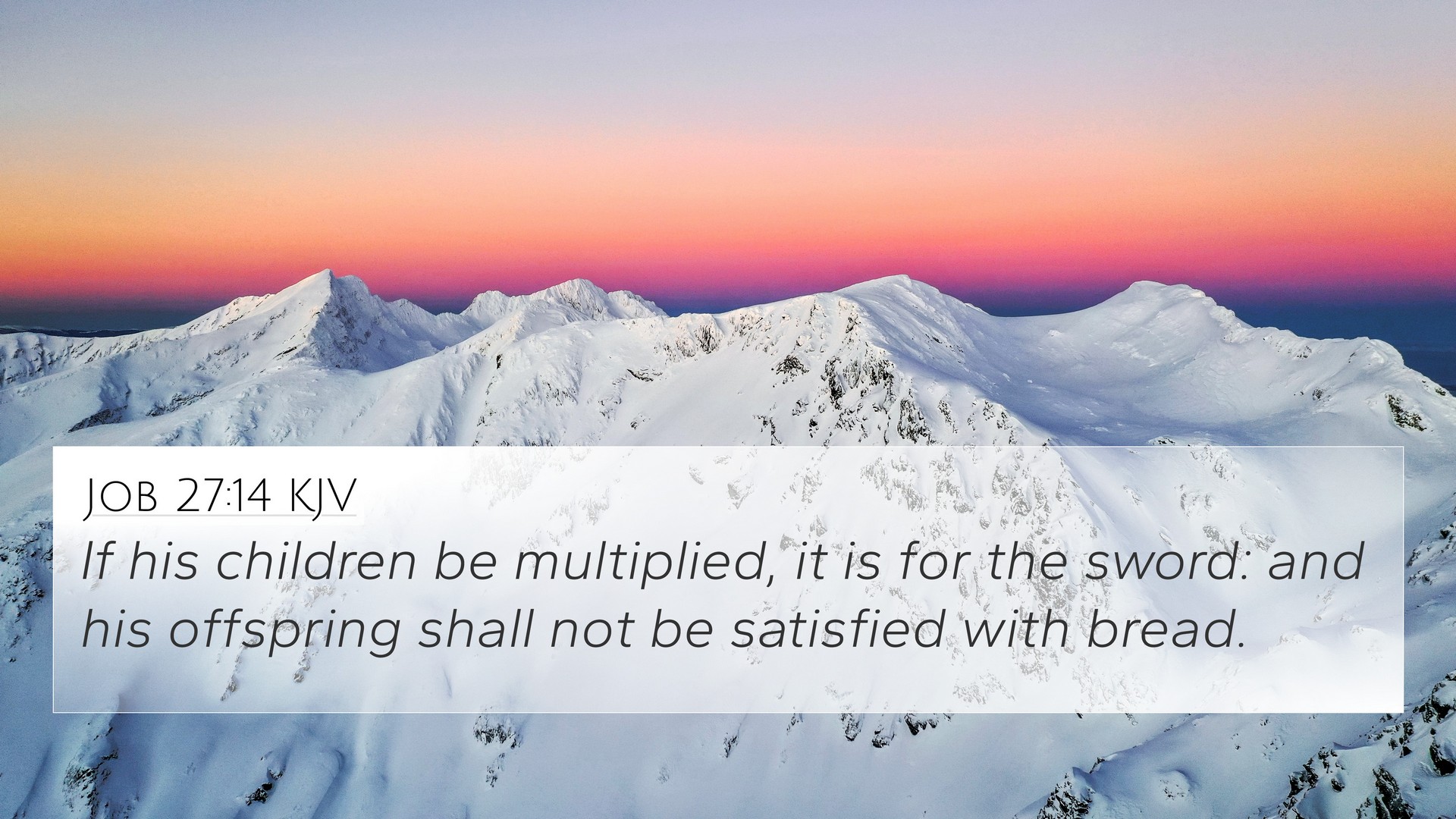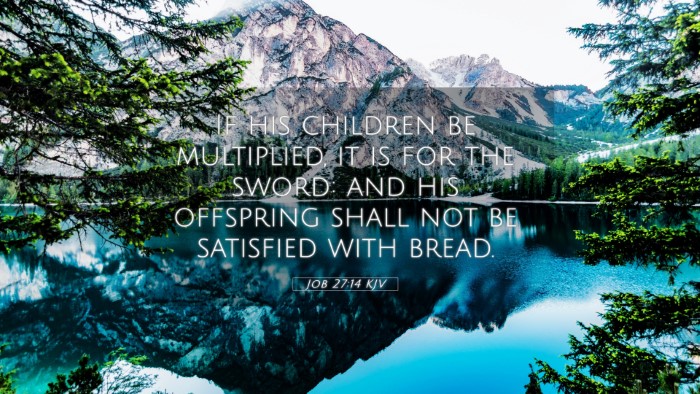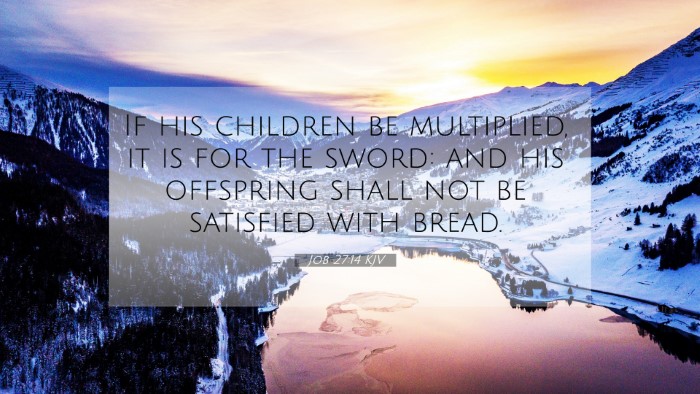Old Testament
Genesis Exodus Leviticus Numbers Deuteronomy Joshua Judges Ruth 1 Samuel 2 Samuel 1 Kings 2 Kings 1 Chronicles 2 Chronicles Ezra Nehemiah Esther Job Psalms Proverbs Ecclesiastes Song of Solomon Isaiah Jeremiah Lamentations Ezekiel Daniel Hosea Joel Amos Obadiah Jonah Micah Nahum Habakkuk Zephaniah Haggai Zechariah MalachiJob 27:14 Similar Verses
Job 27:14 Cross References
If his children be multiplied, it is for the sword: and his offspring shall not be satisfied with bread.
Uncover the Rich Themes and Topics of This Bible Verse
Listed below are the Bible themes associated with Job 27:14. We invite you to explore each theme to gain deeper insights into the Scriptures.
Job 27:14 Cross Reference Verses
This section features a detailed cross-reference designed to enrich your understanding of the Scriptures. Below, you will find carefully selected verses that echo the themes and teachings related to Job 27:14 KJV. Click on any image to explore detailed analyses of related Bible verses and uncover deeper theological insights.
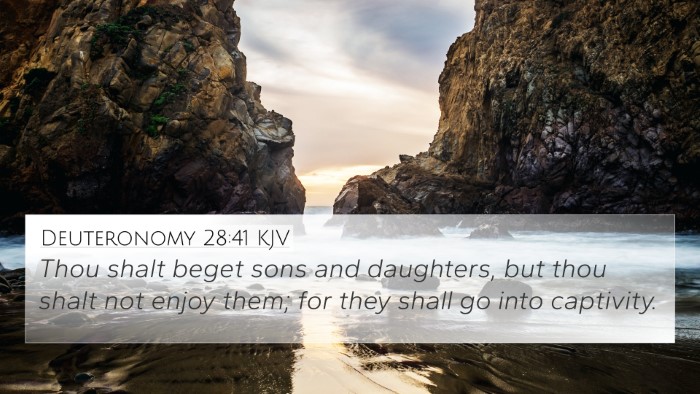
Deuteronomy 28:41 (KJV) »
Thou shalt beget sons and daughters, but thou shalt not enjoy them; for they shall go into captivity.
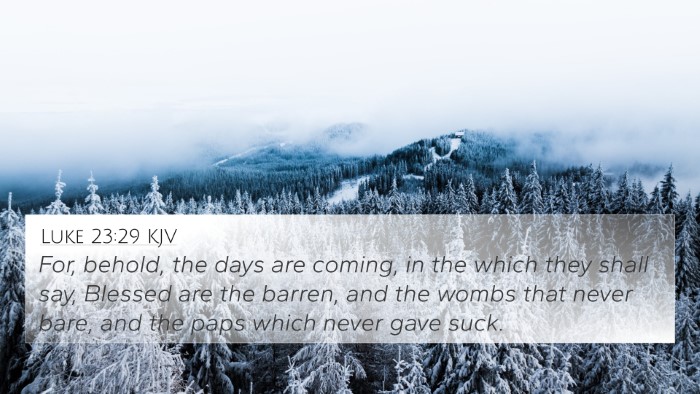
Luke 23:29 (KJV) »
For, behold, the days are coming, in the which they shall say, Blessed are the barren, and the wombs that never bare, and the paps which never gave suck.
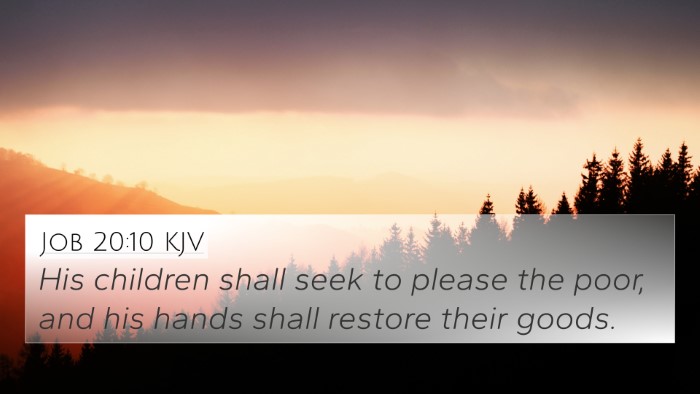
Job 20:10 (KJV) »
His children shall seek to please the poor, and his hands shall restore their goods.
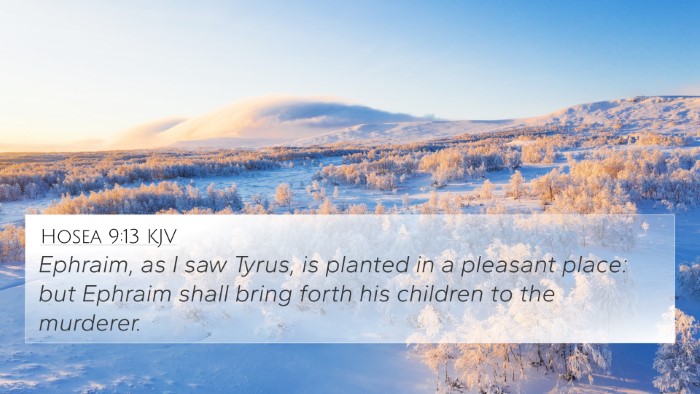
Hosea 9:13 (KJV) »
Ephraim, as I saw Tyrus, is planted in a pleasant place: but Ephraim shall bring forth his children to the murderer.

Psalms 109:13 (KJV) »
Let his posterity be cut off; and in the generation following let their name be blotted out.
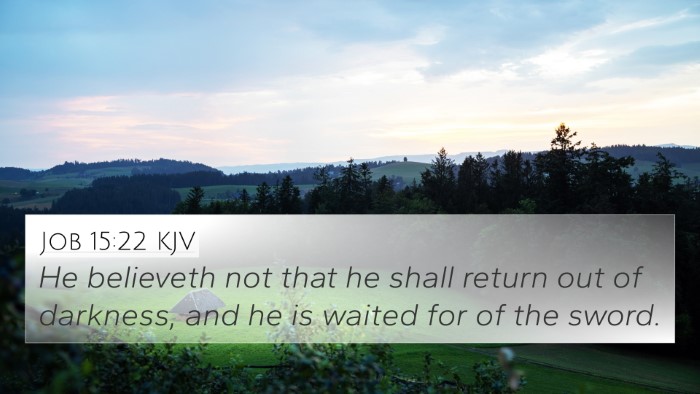
Job 15:22 (KJV) »
He believeth not that he shall return out of darkness, and he is waited for of the sword.
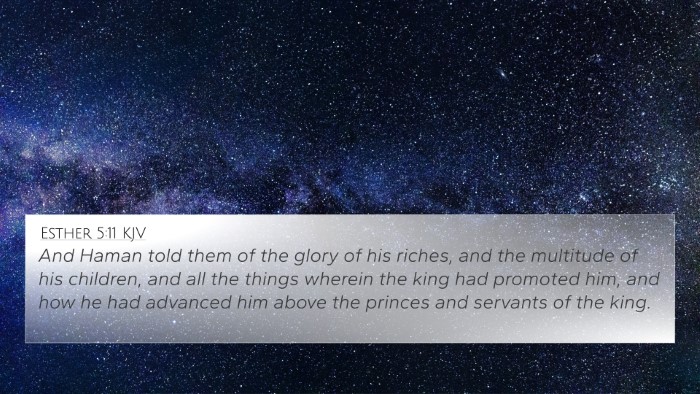
Esther 5:11 (KJV) »
And Haman told them of the glory of his riches, and the multitude of his children, and all the things wherein the king had promoted him, and how he had advanced him above the princes and servants of the king.
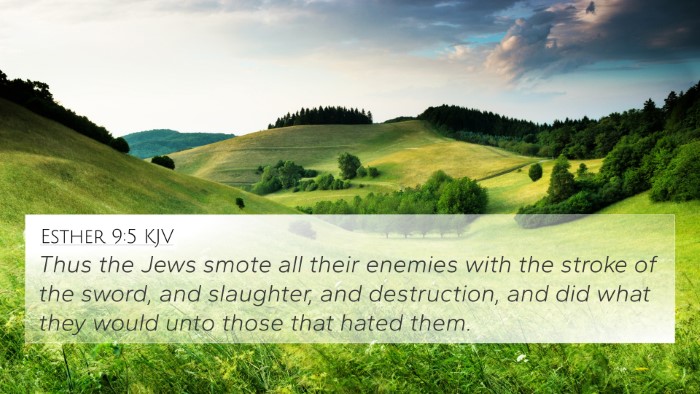
Esther 9:5 (KJV) »
Thus the Jews smote all their enemies with the stroke of the sword, and slaughter, and destruction, and did what they would unto those that hated them.
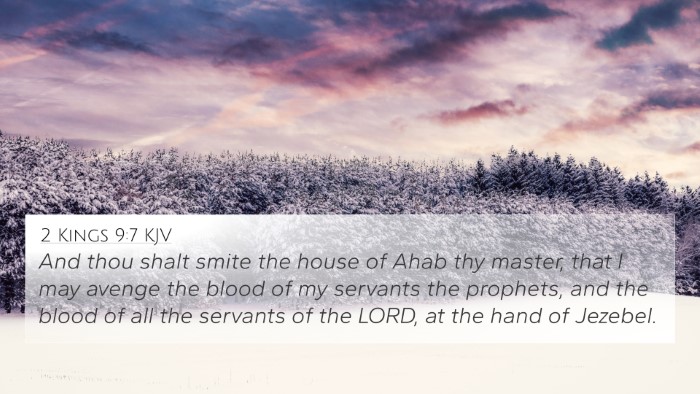
2 Kings 9:7 (KJV) »
And thou shalt smite the house of Ahab thy master, that I may avenge the blood of my servants the prophets, and the blood of all the servants of the LORD, at the hand of Jezebel.
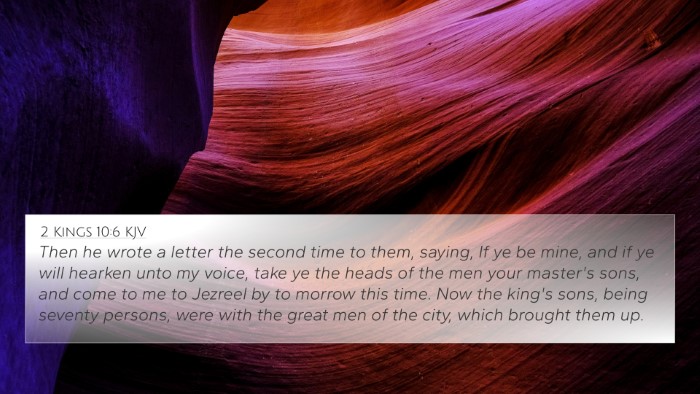
2 Kings 10:6 (KJV) »
Then he wrote a letter the second time to them, saying, If ye be mine, and if ye will hearken unto my voice, take ye the heads of the men your master's sons, and come to me to Jezreel by to morrow this time. Now the king's sons, being seventy persons, were with the great men of the city, which brought them up.
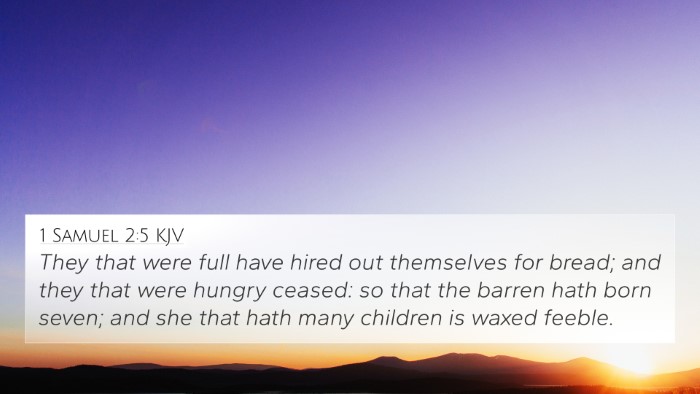
1 Samuel 2:5 (KJV) »
They that were full have hired out themselves for bread; and they that were hungry ceased: so that the barren hath born seven; and she that hath many children is waxed feeble.
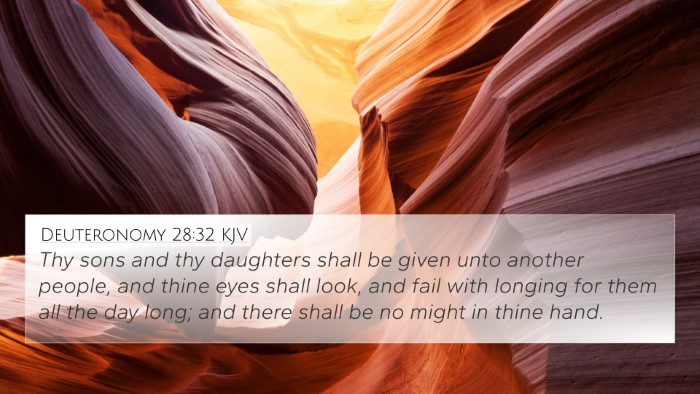
Deuteronomy 28:32 (KJV) »
Thy sons and thy daughters shall be given unto another people, and thine eyes shall look, and fail with longing for them all the day long; and there shall be no might in thine hand.
Job 27:14 Verse Analysis and Similar Verses
Understanding Job 27:14
Job 27:14 states: "If his children be multiplied, it is for the sword: and his offspring shall not be satisfied with bread."
Overview of Job 27:14
This verse appears within a larger discourse where Job asserts the unchanging integrity of his faith amidst suffering. He emphasizes the plight of the wicked, contrasting their fate with that of the righteous, and in this particular verse, highlights the consequences of their actions upon their descendants.
Commentary Insights
-
Matthew Henry:
Henry argues that Job is illustrating a principle in divine justice: the wicked are not only punished themselves but their families suffer as well. The "sword" symbolizes violence and death, indicating that the future generations of the ungodly often face dire circumstances due to their parents' sin.
-
Albert Barnes:
Barnes notes that this verse reflects the idea that prosperity and security are not guaranteed to the children of the wicked. The mention of "bread" signifies basic sustenance, emphasizing a dire state where even the necessities of life are not sufficiently provided for the children of the wicked.
-
Adam Clarke:
Clarke elaborates on the harsh realities portrayed in this passage, suggesting that the offspring of wicked individuals often face broader challenges due to societal retribution that reflects their parents' actions. Their misfortunes are a warning against the pursuit of wickedness.
Bible Verse Cross-References
Job 27:14 connects to several other Scriptures that deal with the fate of the wicked and their children:
- Proverbs 11:21: "Though hand join in hand, the wicked shall not be unpunished: but the seed of the righteous shall be delivered."
- Exodus 20:5: "Visiting the iniquity of the fathers upon the children unto the third and fourth generation of them that hate me."
- Psalms 37:28: "For the Lord loveth judgment, and forsaketh not his saints; they are preserved forever: but the seed of the wicked shall be cut off."
- Isaiah 14:21: "Prepare slaughter for his children for the iniquity of their fathers: that they do not rise, nor possess the land, nor fill the face of the world with cities."
- Ezekiel 18:30: "Therefore I will judge you, O house of Israel, every one according to his ways, saith the Lord God. Repent, and turn yourselves from all your offenses; so sin will not be your downfall."
- Deuteronomy 5:9: "Thou shalt not bow down thyself unto them, nor serve them: for I the Lord thy God am a jealous God, visiting the iniquity of the fathers upon the children unto the third and fourth generation of them that hate me."
- Lamentations 5:7: "Our fathers have sinned, and are not; and we have borne their iniquities."
- Proverbs 13:22: "A good man leaveth an inheritance to his children’s children: and the wealth of the sinner is laid up for the just."
- Jeremiah 32:18: "Thou shewest lovingkindness unto thousands, and recompest the iniquity of the fathers into the bosom of their children after them: the great, the mighty God, the Lord of hosts, is his name."
- Malachi 4:6: "And he shall turn the heart of the fathers to the children, and the heart of the children to their fathers, lest I come and smite the earth with a curse."
Thematic Bible Verse Connections
Job 27:14 serves as a pivotal verse in understanding the nature of divine justice and its repercussions across generations. The consequences of sin, especially regarding family, is a recurring theme in Scripture. The execution of justice often displays a pattern where the actions of the parents directly influence the well-being of their children.
Cross-Referencing Biblical Texts
Employing tools for Bible cross-referencing helps deepen the study of such verses. A good Bible concordance or Bible cross-reference guide can provide insight into how to connect Job 27:14 with other related texts, thereby enriching one’s understanding of divine retribution and familial consequences.
Understanding how to use Bible cross-references can expand one’s view of justice in the Bible and provide clarity for sermon preparation or personal study. Identifying connections between the Old and New Testaments can lead to discovery of similar themes, such as the teachings of Jesus regarding familial and generational consequences of sin.
Conclusion
In conclusion, Job 27:14 raises significant issues regarding the dynamics of sin, consequence, and divine justice. By exploring various public domain commentaries, one gains deeper insights into this verse, facilitating a better understanding of its implications for both the individual and the broader community.
Through comprehensive Bible cross-reference materials, scholars and laypersons alike can engage in a meaningful comparative Bible verse analysis that connects the teachings of Job with the broader narrative of Scripture.
